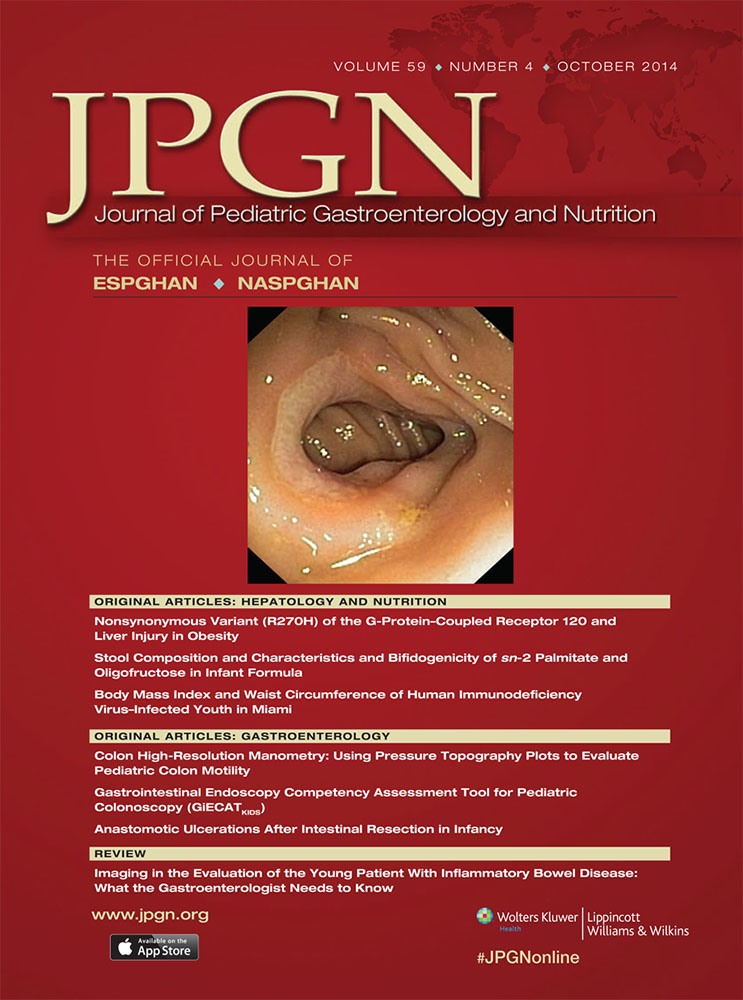Race Affects Outcome Among Infants With Intestinal Failure
All phases of this study were supported by grant no. 1 R21 DK081059-01. C.D. received funding from the Eunice Kennedy Shriver National Institute for Child Health and Human Development (K24 HD058795).
Key individuals who actively participated in the establishment of the Pediatric Intestinal Failure Consortium as well as portions of this study include (by site): Children's Hospital of Pittsburgh: Robert H. Squires, MD; Cartland Burns, MD; George Mazariegos, MD; Anita Nucci, PhD, RD; Jane Anne Yaworski, RN; Danielle Sebbens, DNP, CRNP; Rhonda Cunningham, Administrative Coordinator. Boston Children's Hospital: Christopher Duggan, MD; Daniel Kamin, MD; Tom Jaksic, MD, PhD; Hueng Bae Kim, MD; Sharon Collier, RD, LDN; Melanie Connolly, RD. University of Michigan: Daniel H. Teitelbaum, MD; Pamela Brown, MD; Michele Johnson, LD; Robert Drongowski, MA, Research Coordinator. Nationwide Children's Hospital: Jane Balint, MD; Christina Valentine, MD; Steven Teich, MD; Beth Skaggs, Clinical Research Coordinator. University of California, Los Angeles: Robert Venick, MD; Martin G. Martin, MD, MPP; Patty Beckwith, RD, CDE; James Dunn, MD, PhD; Douglas G. Farmer, MD; Laurie Reyen, RN, MN. University of California, San Francisco: Susan Rhee, MD; Diana Farmer, MD; Sang-Mo Kang, MD; Lane Bower, dietitian. University of Nebraska: Debra Sudan, MD; David Mercer, MD; Dean L. Antonson, MD; Steve C. Raynor, MD; Brandy Sunderman, RD; Kris Seipel, Clinical Studies Program Coordinator. Vanderbilt University: J. Andres Martinez, MD; Brent Polk, MD; Martha Ballew, MEd, RD. Texas Children's Hospital: Beth A. Carter, MD; Mary Brandt, MD; Saul Karpen, MD, PhD; Sara Philips, RD; Kristin Brown, RD; Alejandro De La Torre. Children's Hospital of Colorado, Denver: Jason Soden, MD; Sara Fidanza, NP; Kristin Brown, RD. Seattle Children's Hospital: Simon Horslen, MD; Frances Malone, ARNP, PhD; Patrick Healey, MD; Jorge Reyes, MD; Cheryl Davis, RD. Cincinnati Children's Hospital: Jeffrey A. Rudolph, MD; Samuel Kocoshis, MD; Greg Tiao, MD; Jacqueline Wessel, Nurse Coordinator. Children's Memorial Hospital: Riccardo Superina, MD; Valeria Cohran, MD; Kimberley Kazmerski, RD; Lisa Keys, BSN, RN; Margaret “Peggy” Richard, RN. University of Calgary: David Sigalet, MD, PhD. Emory University: Conrad Cole, MD. University of Pittsburgh School of Public Health: Steven H. Belle, PhD, MScHyg; Ruosha Li, PhD; Sharon Lawlor, MBA; Tamara Haller, BS; Marcia Kurs-Lasky, MS.
The authors report no conflicts of interest.
ABSTRACT
Objective:
Intestinal failure (IF) is a rare, devastating condition associated with significant morbidity and mortality. We sought to determine whether ethnic and racial differences were associated with patient survival and likelihood of receiving an intestinal transplant in a contemporary cohort of children with IF.
Methods:
This was an analysis of a multicenter cohort study with data collected from chart review conducted by the Pediatric Intestinal Failure Consortium. Entry criteria included infants ≤12 months receiving parenteral nutrition (PN) for ≥60 continuous days and studied for at least 2 years. Outcomes included death and intestinal transplantation (ITx). Race and ethnicity were recorded as they were in the medical record. For purposes of statistical comparisons and regression modeling, categories of race were consolidated into “white” and “nonwhite” children.
Results:
Of 272 subjects enrolled, 204 white and 46 nonwhite children were available for analysis. The 48-month cumulative incidence probability of death without ITx was 0.40 for nonwhite and 0.16 for white children (P < 0.001); the cumulative incidence probability of ITx was 0.07 for nonwhite versus 0.31 for white children (P = 0.003). The associations between race and outcomes remained after accounting for low birth weight, diagnosis, and being seen at a transplant center.
Conclusions:
Race is associated with death and receiving an ITx in a large cohort of children with IF. This study highlights the need to investigate reasons for this apparent racial disparity in outcome among children with IF.




